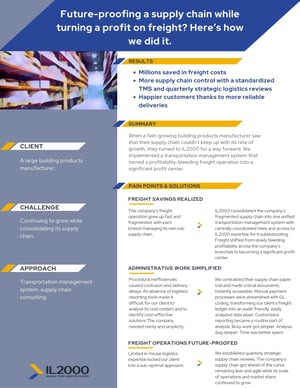SUMMARY
When a fast-growing building products manufacturer saw that their supply chain couldn’t keep up with its rate of growth, they turned to IL2000 for a way forward. We implemented a transportation management system (TMS) that turned a profitability-bleeding freight operation into a significant profit center. Over 20 years later, they’re still ahead of the curve.
COMPANY PROFILE
Our client is a large nationwide building products manufacturer. With 75 locations across the US, the company ships high-quality building products to professional builders and contractors. IL2000 began work with this company way back in 1999. They were a key player in the building products space even then and valued at around $90 million. But our client’s growth has been truly phenomenal; today they are worth over $1 billion.
The company has built a great reputation for selling a quality product, but its brand is also recognized for the reliability of its shipping. It'll arrive when they say it'll arrive: A make-or-break factor for many time-strapped contractors. The strength of our client's supply chain is therefore critical to winning hearts and minds in the building products space.
PAIN POINTS
- The company’s freight operation grew up fast and fragmented, with each branch managing its own production and logistics (P&L) team, setting its own rates, and making decisions using a limited silo of supply chain data. A decentralized approach may have supported agility early on, but with a bigger scale of operation, that disarray was becoming a millstone around the company’s neck.
- Adding to that structural entropy, a lack of detailed financial reporting tools made it harder for our client to analyze its cost centers and identify cost-effective solutions. Procedural inefficiencies caused confusion and were trickling into delivery delays. This was gradually eroding customer satisfaction and eating into profitability. The company needed clarity.
- Our client knew they needed to build a more efficient, more agile supply chain. But limited in-house logistics expertise locked them into a sub-optimal approach. A critical knowledge gap meant that, while they were aware of their logistical shortfalls, they were not well-positioned to formulate an effective response.
CHALLENGE
Our client’s challenge was to find a way to continue its growth success story while deepening its base of knowledge, simplifying freight infrastructure, and securing better economies of scale.
SOLUTION
IL2000’s work with this company is a perfect example of how some logistics solutions need to change and grow. The first stage of our work was to overhaul the company’s supply chain with a unified transportation management system. Building on that stable foundation, we were then able to help our client remain well-positioned to stay ahead of new logistics challenges as they emerged.
Freight savings realized
IL2000 consolidated the company’s fragmented supply chain into one unified transportation management system. Instead of each branch charging carriers at their own rates, the TMS offered a centrally coordinated conduit for negotiating rates with carriers. Supporting this unification of practice, we modernized their supply chain processes to incorporate optimized freight quoting and bookings across modes, backstopped with immediate access to IL2000 logistics planners who could jump in and negotiate with carriers on our client’s behalf. With this enhanced framework locked down, IL2000 could leverage the company’s aggregate spend to negotiate significantly lower rates. Our client turned a significant fiscal corner: Freight shifted from slowly bleeding profitability across the company’s branches to becoming a significant profit center.
Administrative work simplified
The IL2000 TMS infused the company with better tools and resources for getting day-to-day work done. Before the TMS swung into action, the company’s freight documentation was scattered and difficult to access. After the system came online, every corner of our client’s paper trail was centralized, organized, and instantly accessible. Manual payment processes were streamlined with GL coding, rapidly transforming our client’s byzantine freight ledger into a sleek, audit-friendly, deeply analyzable data asset. Wish listed reports — such as instant cost assignments by branch down to the individual shipment — could be pulled up effortlessly. Customized reporting became a routine part of analysis, offering targeted insight and supporting plans for a better way forward. Busy work got simpler. Analysis dug deeper. Time was better spent.
Freight operations future-proofed
But our client was a dynamic and constantly growing company, and it needed more than a one-and-done solution. We established quarterly strategic supply chain reviews, where we met to identify, define and tackle freight uncertainties that lay just around the company's corner. We offered them more than just a static answer to today's logistics challenges. Through our relationship, the company's supply chain got ahead of the logistics curve, remaining lean and agile while its scale of operations and market share continued to grow. Twenty years later, they're still ahead of the curve.
RESULTS
- Millions saved in freight costs.
- Greater supply chain control, with a unified transportation management system and standardized processes.
- Enhanced accounting and auditing capacity, with all freight transactions visible for detailed audit and analysis.
- Strengthened relationships with customers and builders, cultivating an untarnished reputation for reliability.
Download the One Page Case Study here


